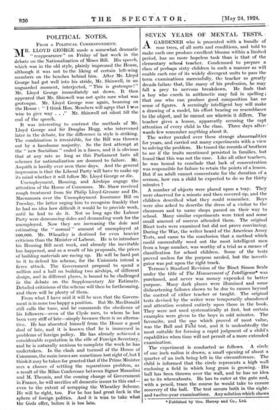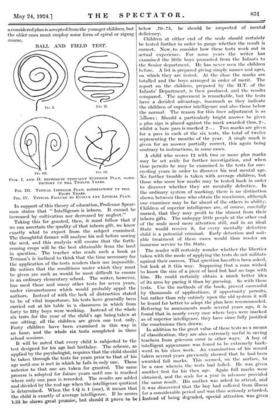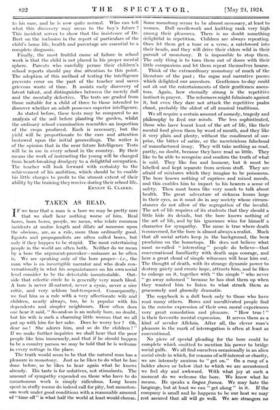SEVEN YEARS OF MENTAL TESTS.
AGARDENER who is presented with a bundle of rose trees, of all sorts and conditions, and told to make each one produce excellent blooms within a limited period, has no more hopeless task than is that of the elementary school teacher. Condemned to prepare a class of perhaps sixty children in such a manner as will enable each one of its widely divergent units to pass the term examinations successfully, the teacher so greatly dreads failure that, like ,many of his profession, he may fall a prey to nervous breakdown. He finds that a boy who excels in arithmetic may fail in spelling ; that one who can produce good composition has no sense of figures. A seemingly intelligent boy will make a drawing of a model, his effort bearing no resemblance to the object, and he cannot see wherein it differs. The teacher gives a lesson, apparently securing the rapt attention of every child in the class. Three days after-* wards few remember anything about it.
The writer puzzled over these strange abnormalities for years, and carried out many experiments with a view to solving the problem. He traced the records of brothers to see if the traits mentioned persisted in families, but found that this was not the case. Like all other teachers, he was bound to conclude that lack of concentration was responsible for failure to retain the points ofa lesson. But if an adult cannot concentrate for the duration of a sermon, how can a child be expected to do so for thirty minutes ?
A number of objects were placed upon a tray. They were observed for a minute and then covered Up, and the children described what they could remember. Boys were also asked to describe:the dress of a visitor to the classroom and to name shops passed on their way to school. Many similar experiments were tried and some small amount of success attended them. The original Binet tests were examined but did not prove convincing. During the War, the writer heard of the American Army Tests, and came to the conclusion that a method which could successfully weed out the most intelligent men from a huge number, was worthy of a trial as a means of classification for school children. Some of the tests proved useless for the purpose needed, but the investi-: gator was put upon the right track.
Terman's Stanford Revision of the Billet Simon Scale under the title of The Measurenzent of Intelligence* was purchased, and never was money expended to better purpose. Many dark places were illumined and some disheartening failures shown to be due to causes beyond the control of either teacher or taught. The original tests devised by the writer were temporarily abandoned and attention centred entirely upon those in the book. They were not used systematically at first, but certain examples were given to the boys in odd minutes. The favourite, and the one Which proved of most value, was the Ball and Field test, and it is undoubtedly the most suitable for forming a rapid judgment of a child's capabilities when time will not permit of a more extended examination.
The- experiment is conducted as follows. A circle of one inch radius is drawn; a small 'opening of about a quarter of an inch being left in the circumference. The child is informed that the circle represents a high wall enclosing a field in which long grass is growing. His ball has been thrown over the wall, and he has no idea as to its whereabouts. He has to enter at the gate and, with a pencil, trace the course he would take to ensure recovery of the ball. The test occurs both in the eight- and twelve-year examinations. Any solution which shows *Published by Geo. liarrap and Co, Ltd. a considered plan is accepted from the younger children, but the older ones must employ some form of spiral or zigzag course.
BALL AND FIELD TEST.
FIGS. I. AND II. REPRESENT TYPICALLY SUPERIOR PLAN, SATIS- FACTORY UP TILL TWELVE YEARS.
FIG. M. TYPICAL INFERIOR PLAN, SATISFACTORY UP TILL Exam YEARS.
FIG. IV. TYPICAL FAILURE TO EVOLVE. ANY LOGICAL PLAN.
In support of this theory of education, Professor Spear- man states that "Intelligence is inborn. It cannot be increased by cultivation nor decreased by neglect."
Taking this for granted, then, it must follow that if we can ascertain the quality of that inborn gift, we know exactly what to expect from the subject examined. The thoughtful farmer will analyse his soil before sowing the Seed, and this analysis will ensure that the forth- coming crops will be the best obtainable from the land in question. The teacher who reads such a book as Terman's is inclined to think that the time necessary for the application of the tests renders their use impossible. He notices that the conditions under which they must be given are such as would be most difficult to ensure in an ordinary elementary school. The writer, however, has used these and many other tests for seven years, under circumstances which would probably appal the authors. Instead of with the lack of distraction stated to be of vital importance, his tests have generally been carried out at his table in -a classroom in which from forty to fifty boys were 'working. Instead of the whole six tests for the year of the child's age being taken at one sitting, all the children are given one test only. Forty children have been examined in this way in an hour, and the whole six tests completed in three school sessions.
It will be noted that every child is subjected to the test designed for his age last birthday. The scheme, as applied by the psychologist, requires that the child should be taken through the tests for years prior to that of his age until one is met in which he fails in only one. Those anterior to that one are taken for granted. The same process is adopted for future years until one is reached where only one pass is. recorded. The results are added and divided by the real age when the intelligence quotient is determined. When the 1.Q is 1 (one), it means that the child is exactly of average intelligence. If he scores 1.25 he shows great promise, but should it prove to be below .70-.75, he should be suspected of mental deficiency.
Children at either end of the scale should certainly be tested further in order to gauge whether the result is correct. Now, to consider how these tests work out in actual experience. For some years the writer has examined the little boys promoted from the Infants to the Senior department. He has never seen the children before. A list is prepared giving simply names and ages, on which they are tested. At the close the marks are totalled and the boys arranged in order of merit. The report on the children, prepared by the H.T. of the Infants' Department, is then produced, and the results compared. The agreement is remarkable, but the tests have a decided advantage, inasmuch as they indicate the children of superior intelligence and also those below the normal. The reason for this finer adjustment is as :ollows : Should a particularly bright answer be given a plus sign is placed against the mark awarded thus, 2+, whilst a bare pass is marked 2—. Two marks are given for a pass in each of the six tests, the total of twelve representing the months of the year. A single mark is given for an answer partially correct, this again being contrary to instructions, in some cases.
A child who scores 12 with two or more plus marks may be set aside for further investigation, and when time permits he may be examined in the tests for suc- ceeding years in order to discover his real mental age. No further trouble is taken with average children, but those who score low marks may be tested back in order to discover whether they are mentally defective.. In the ordinary system of marking, there is no distinction shown between those who obtain the maximum, although one examinee may be far ahead of the others in ability. Children of superior intelligence are, of course, carefully nursed, that they may profit to the utmost from their inborn gifts. The unhappy little people at the other end of the scale need more attention still, and in an ideal State would receive it, for every mentally defective child is a potential criminal. Early detection and suit- able treatment of these cases would thus render an immense service to the State.
The reader will certainly wonder whether the liberties taken with the mode of applying the tests do not militate against their success. That question has often been asked, but look at it this way. Supposing that a man wished to know the size of a piece of land but had no tape with him. He could certainly obtain a much better idea of its area by pacing it than by guessing. So with these tests. Use the methods of the book, proved successful by thousands of applications, if opportunity permits, but rather than rely entirely upon the old system it will be found far better to adopt the plan here recommended. Referring to assessments made several years ago, it is found that in nearly every ease where boys were marked as of superior intelligence, they have since fully justified the conclusions then drawn. .
In addition to the great value of these tests as a means of classification, they are also extremely useful in saving teachers from grievous error in other ways. A boy of intelligent appearance was found to be extremely back- ward in his class work. An examination of his record taken several years previously showed that he had been awarded full marks. This seemed, on the surface, to be a case wherein the tests had failed. He was given another, test for his then age. Again full marks were obtained, and the scale for a year in advance provided the same result. His mother was asked to attend, and it. was discovered that the boy had suffered from illness for a considerable period and was thus seriously retarded. Instead of being degraded, special attention was given - to his case, and he is now quite normal. Who can tell what this discovery may mean to the boy's future ? This incident serves to show that the insistence of Dr. Burt on the inclusion in the report of particulars of the child's home life, health and parentage are essential to a complete diagnosis.
Finally, the most fruitful cause of failure in school work is that the child is not placed in his proper mental sphere. Parents who carefully peruse their children's school reports should pay due attention to this point. The adoption of this method of testing the intelligence prevents error on the part of the teacher and saves grievous waste of time. It assists early discovery of latent talent, and distinguishes between the merely dull and the mentally defective. The tests are graded from those suitable for a child of three to those intended to discover whether an adult possesses superior intelligence.
As stated before, these tests may be compared to an analysis of the soil before planting the garden, whilst the ordinary school examination resembles an inspection of the crops produced. Each is necessary, but the yield will be proportionate to the care and attention bestowed upon the initial proceedings. The writer is of the opinion that, in the near future Intelligence Tests will be in use in every school in the country. By their means the work of instructing the young will be changed from heart-breaking drudgery to a delightful occupation.
The teacher will look forward with certainty to the achievement of his ambition, which should be to enable his little charges to profit to the utmost extent of their ability by the training they receive during their school life.
ERNEST G. CLARKE.












































 Previous page
Previous page